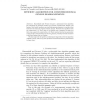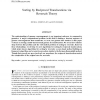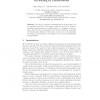18 search results - page 1 / 4 » Efficient algorithms for multichromosomal genome rearrangeme... |
JCSS
2002
13 years 10 months ago
2002
Hannenhalli and Pevzner [5] gave a polynomial time algorithm for computing the minimum number of reversals, translocations, fissions, and fusions, that would transform one multichr...
BMCBI
2006
13 years 11 months ago
2006
Background: Analysis of genomes evolving via block-interchange events leads to a combinatorial problem of sorting by block-interchanges, which has been studied recently to evaluat...
JCB
2007
13 years 10 months ago
2007
The understanding of genome rearrangements is an important endeavor in comparative genomics. A major computational problem in this field is finding a shortest sequence of genome...
RECOMB
2005
Springer
14 years 11 months ago
2005
Springer
The study of genome rearrangements is an important tool in comparative genomics. This paper revisits the problem of sorting a multichromosomal genome by translocations, i.e. exchan...
RECOMB
2010
Springer
13 years 8 months ago
2010
Springer
Background: Genomic rearrangements have been studied since the beginnings of modern genetics and models for such rearrangements have been the subject of many papers over the last ...




